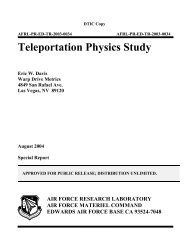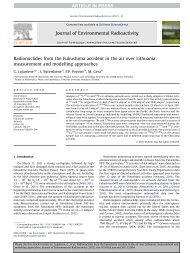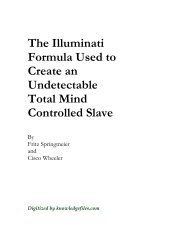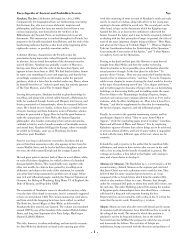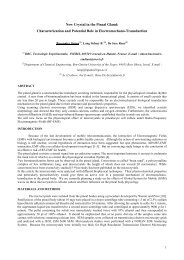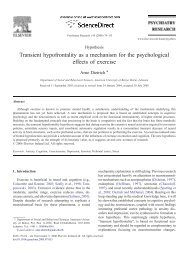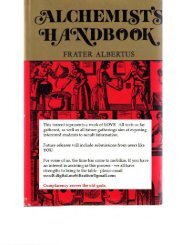Psychology of Terrorism - National Criminal Justice Reference Service
Psychology of Terrorism - National Criminal Justice Reference Service
Psychology of Terrorism - National Criminal Justice Reference Service
Create successful ePaper yourself
Turn your PDF publications into a flip-book with our unique Google optimized e-Paper software.
third option involves becoming 'through action and reinterpretation <strong>of</strong> group characteristics morelike the superior group'-Implicit in Tajfel's theory is the idea that an inferior group will inevitably possess a negative socialidentity at some time. As he notes, there is fairly abundant evidence from many parts <strong>of</strong> the worldthat members <strong>of</strong> underprivileged groups emerge quite <strong>of</strong>ten in in-group devaluation or denigrationand consequently show signs <strong>of</strong> out group favoritism.-Observers during the more recent past appear to have concluded that the Catholics in NorthernIreland do in fact possess a positive social identity.-Tajfel has pointed out that an important consequence <strong>of</strong> social competition may be that the so-calledinferior group, while wishing to retain its own identity, at the same time wishes to become; more likethe majority in their opportunities <strong>of</strong> achieving goals and marks <strong>of</strong> respect which are generallyvalued by the society at large.-Northern Ireland watchers appear to have been in little doubt for some time that the protestantcommunity has enjoyed a positive social identity.35. Cairns, E. (1966). Social identity and intergroup conflict: A developmental perspective . J. Harbinson (Ed),Growing up on Northern Ireland (pp. 115-130). Belfast: Stranmillis College.Call Number: Editor's Annotation: It is the aim <strong>of</strong> this chapter to show that the conflict in NorthernIreland is based on entirely rational processes which are at work in every society but which take on aspecial significance because <strong>of</strong> the historical context <strong>of</strong> the conflict in Northern Ireland. Thischapter will do this by adopting a social psychological approach based on a theory known as SocialIdentity theory (Tajfel, 1981). This theory suggests that we tend to simplify our social environmentby forming groupings <strong>of</strong> persons (social categories). Certain aspects <strong>of</strong> our self- concept are thenbased on our social group or category membership (social identity). A basic assumption <strong>of</strong> thetheory is that people are motivated to enhance their self-concept and, to do this, will thus seek apositive social identity. Further, as acquiring a positive social identity means that our own groupmust be favorably different from relevant comparison groups, we either leave groups that do notfulfill this requirement to strive to make the groups to which we belong ‘positively distinct’ (Turner,1987).- Northern Irish people claim to be able to use various cues to determine other people’s religiousgroup membership.- What is important, as Burton (1979) has pointed out is that this phenomenon, ‘telling’ he calls it,reveals the importance attached to this activity in Northern Ireland.- The five most commonly mentioned cues were the area where a person lives, the school theyattended, their name, their appearance and the way they spoke.- Cairns (1980) also reported that people in Northern Ireland claim to be able to tell whether a personis a Catholic or a Protestant by looking at the person’s face.-The psychological significance <strong>of</strong> ‘telling’ therefore largely passed unnoticed until the development<strong>of</strong> a new social psychological theory on intergroup conflict, Social Identity theory (Tajfel, 1981)- This theory to Social Identity theory social categorization is a process which is at work in everysociety and is a process which is used to make life simple by reducing the multiplicity <strong>of</strong> socialstimuli we are faced with in everyday life to a smaller more manageable number <strong>of</strong> social categories.- An important consequence <strong>of</strong> the process <strong>of</strong> social categorization, the theory suggests, is that wenot only divide our social world into groups or categories but we inevitably see ourselves asbelonging to certain <strong>of</strong> these social categories but not others.- There is in fact abundant evidence that adults in Northern Ireland will readily admit to membership<strong>of</strong> one or other <strong>of</strong> the two groups. As children learn about the division <strong>of</strong> Northern Irish society intotwo major groups, they are at the same time learning which <strong>of</strong> these groups they belong to.- Cairns (1982), who reviewed evidence based on observations by social anthropologists, historians,and other social scientists, has concluded that both groups in Northern Ireland, Catholics andProtestants, appear to possess ‘relatively positive social identities’.- Weinreich (1982) ‘Identity conflicts’ he defined as those conflicts which emerged when anindividual empathically identifies with another and yet at the same time wishes to disassociate himor herself from certain <strong>of</strong> the other person’s characteristics. He reported that, compared to hisProtestant respondents, the young Catholics who took part in his study showed more evidence <strong>of</strong>‘identity conflicts’ with their own group.



